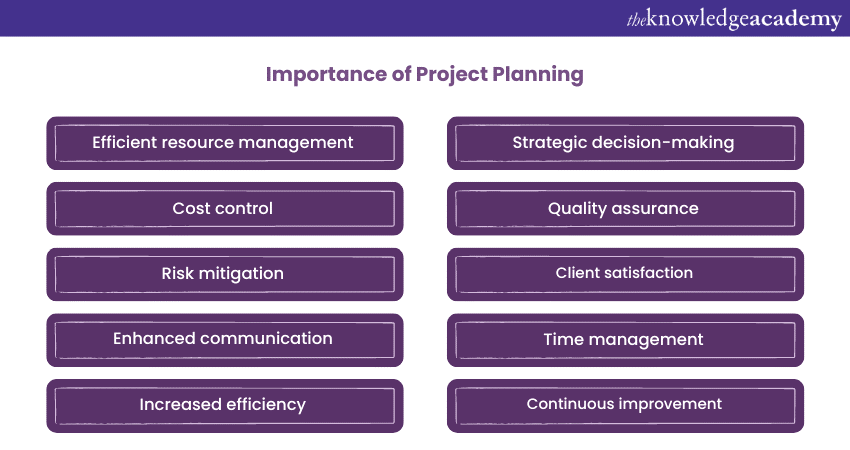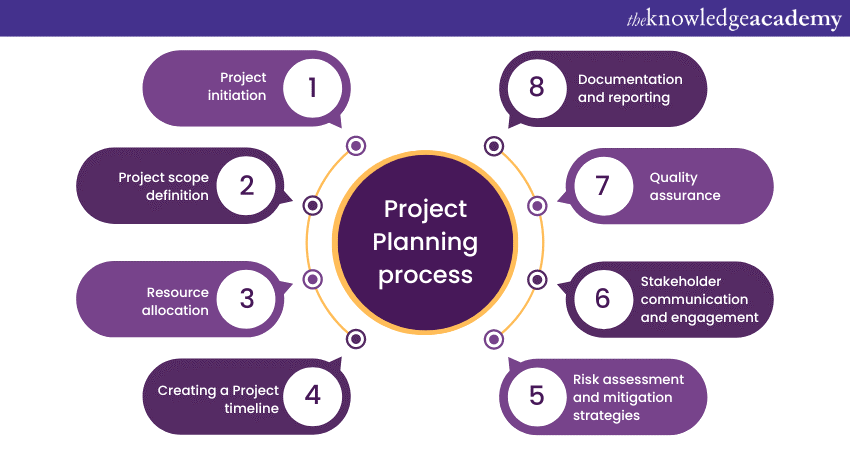We may not have the course you’re looking for. If you enquire or give us a call on 01344203999 and speak to our training experts, we may still be able to help with your training requirements.
Training Outcomes Within Your Budget!
We ensure quality, budget-alignment, and timely delivery by our expert instructors.

Project Planning is the process of carefully thinking through and organising everything needed to successfully complete a Project. It answers the question, "What is Project Planning?" It's like creating a detailed roadmap before starting a journey.
As per Indeed, the average salary for a project planner is £45,704 per year in the United Kingdom. Learn "What is Project Planning" and its vital role in Project success. Master effective planning strategies in this comprehensive blog. Read more to learn!
Table of Contents
1) Importance of Project Planning
2) The key elements of Project Planning
3) Project Planning process
4) Real-world examples of successful Project Planning
5) Conclusion
Importance of Project Planning
Project Planning is crucial for success in today's world. It's more than just a guide for getting things done; it helps organisations to make smart strategies, reduce risks, and work more efficiently. Here’s a list of objectives you can achieve through Project Planning:

a) Efficient resource management: In a world where resources are finite, Project Planning ensures their optimal allocation. It helps identify the right people, materials, and equipment needed, reducing waste and enhancing cost-effectiveness.
b) Cost control: Effective Project Planning isn't just about getting things done; it's also about managing costs. It allows for accurate budgeting, cost estimation, and tracking, preventing financial surprises along the way.
c) Risk mitigation: Projects rarely go exactly as planned. That's where Project Planning shines. It anticipates potential hiccups and devises strategies to mitigate risks. This proactive approach minimises disruptions, saving time and money.
d) Enhanced communication: Projects involve numerous team members and stakeholders. A well-structured Project plan serves as a common reference point, making sure everyone is on the same page. It reduces misunderstandings, conflicts, and delays.
e) Increased efficiency: Efficiency is very important tool in today's fast-paced world. Project Planning streamlines processes, identifies bottlenecks, and eliminates redundancies. It makes sure that every task serves a purpose, contributing to the overall Project success.
f) Strategic decision-making: Project Planning isn't just a to-do list; it's a strategic framework. It helps in prioritising tasks, setting realistic goals, and adapting to changing circumstances. In essence, it empowers decision-makers with the insights needed to navigate complexities.
g) Quality assurance: Quality is a non-negotiable aspect of many Projects, particularly in industries like healthcare and software development. Project Planning includes quality checks and ensures that every phase of the Project maintains high standards.
h) Client satisfaction: For businesses, satisfied clients are essential. Project Planning ensures that client requirements are thoroughly understood and met. Meeting or exceeding expectations leads to happy clients and repeat business.
i) Time management: Time is often the most limited resource. A well-structured Project plan accounts for every minute, ensuring tasks are completed on schedule. This punctuality can make or break a Project's success.
j) Continuous improvement: Project Planning is a learning process. After each Project, teams can review what went well and what didn't. These insights are then used to refine future Project plans, creating a culture of continuous improvement.
The key elements of Project Planning
Project Planning is a multifaceted discipline that relies on several key elements to ensure successful Project Execution. Understanding and effectively integrating these elements is paramount to achieving Project objectives. Let's delve deeper into each of these fundamental components:
Project scope definition
Before embarking on any Project, it's essential to define the Project's scope comprehensively. This entails specifying the Project's objectives, boundaries, deliverables, and constraints. A well-defined scope sets clear parameters for the Project, preventing scope creep and ensuring alignment with the intended outcomes.
Project objectives and goals
Project Planning involves setting clear, measurable, achievable, relevant, and time-bound (SMART) objectives and goals. These objectives provide the Project's purpose and direction, guiding every decision and action throughout the Project lifecycle.
Resource management
Effective allocation of resources is a critical aspect of Project Planning. It entails determining and securing the necessary resources, including human resources, materials, equipment, and budget. Adequate resource allocation ensures that the Project has the essential tools and personnel to accomplish its goals within the stipulated constraints.
Project timeline
Developing a well-structured Project Management Timeline is akin to creating a detailed itinerary for a journey. It involves breaking down the Project into specific tasks, setting milestones, and establishing dependencies among these tasks. A robust timeline facilitates task scheduling, ensures accountability, and allows for efficient Project tracking and management.
Risk assessment and mitigation
In the ever-changing landscape of Project Management, risk is an ever-present companion. Project Planning incorporates risk assessment and mitigation strategies to anticipate and address potential challenges. Identifying risks early in the planning phase enables Project teams to develop proactive strategies to mitigate them, reducing the likelihood of disruptions during Project execution.
Stakeholder identification and communication
Effective Project Planning acknowledges the importance of Stakeholders. Identifying all relevant stakeholders, understanding their interests and expectations, and developing a tailored Project communication Plan are crucial. Open and transparent communication ensures that all parties involved are informed, engaged, and aligned with the Project's objectives.
Quality assurance
Quality is a non-negotiable aspect of many Projects, particularly in fields like healthcare, manufacturing, and software development. Project Planning includes measures for quality assurance, ensuring that every phase of the Project adheres to predefined quality standards. This commitment to quality enhances the Project's overall success and client satisfaction.
Change management
As Projects progress, changes are inevitable. Effective Project Planning includes Change Management Strategies to address modifications to the Project scope, timeline, or objectives. A structured approach to change management helps maintain Project focus and adaptability.
Take charge of your Projects with our Project Planning And Control Training – master the art of planning and control.
Project Planning process
Project Planning is far more than just setting objectives and creating a timeline. It's a comprehensive process that demands careful consideration of various facets. Discussed below are the essential steps in the Project Planning process:

Project initiation
Project Initiation Phase marks the beginning of your Project. It's when you define the Project's purpose and objectives. You also identify who will be involved and what resources you might need. Think of it as the Project's birth certificate, where you set its direction and goals.
Project scope definition
In this step, you clearly outline what the Project will encompass and what it won't. It's like defining the boundaries of a property. You also set specific objectives that the Project aims to achieve. This phase ensures that everyone understands the Project's limits and goals.
Resource allocation
Resource allocation involves identifying and securing the necessary resources, such as people, materials, and budget, to carry out the Project. It's like making sure you have all the tools and supplies you need before starting a DIY Project at home.
Creating a Project timeline
Here, you create a detailed plan of the Project's timeline. You make the Project into smaller tasks, set milestones, and determine the order in which tasks should be completed. It's similar to creating a to-do list with deadlines for each task.
Risk assessment and mitigation strategies
This step is about identifying potential risks that could impact the Project and coming up with plans to deal with them. It's like anticipating possible roadblocks on a journey and having contingency plans in case things don't go as expected.
Stakeholder communication and engagement
Effective Communication with every individual involved in the Project is crucial. You need to create a plan for how you'll share information and involve stakeholders throughout the Project. It's like ensuring everyone on a team is well-informed and stays engaged in the Project's progress.
Quality assurance
Quality assurance involves defining the standards and criteria that the Project's deliverables must meet. It's like setting quality standards for a product to ensure it meets customer expectations.
Documentation and reporting
Keeping detailed records and providing regular progress reports are essential. It's like maintaining a logbook during a journey to record important information and milestones along the way. These records help track the Project's progress and make informed decisions.
Master the art of Project Planning and control – lead your Projects to success with our Project Planning and Control Course!
Real-world examples of successful Project Planning
Project Planning isn't just a theoretical concept; it's a critical practice that has yielded remarkable successes in various industries. Let's explore real-world examples of Projects where meticulous planning played a pivotal role in their triumph:
Apollo 11 Moon Landing (1969)
Meticulous Project Planning was the lifeline of this historic endeavour. NASA left no stone unturned in planning every detail, from spacecraft design to launch and lunar landing. Precise calculations ensured that the spacecraft reached the moon, landed safely, and returned to Earth within narrow margins of error, showcasing the power of planning in achieving the seemingly impossible.
The Channel Tunnel (Eurotunnel) (1994)
The successful construction of the Channel Tunnel owes much to effective Project Planning. The Project spanned countries, languages, and technical challenges. Detailed planning included coordinating tunnel boring machines from both sides of the Channel to meet precisely in the middle. This level of precision showcased how planning can mitigate risks and ensure the on-time delivery of a colossal infrastructure Project.
London 2012 Olympics (2012)
Hosting an event of this magnitude demanded years of intricate Project Planning. From building state-of-the-art venues to managing transportation logistics and ensuring security, planning played a vital role in making the London Olympics a resounding success. The seamless execution of the Games was a testament to the meticulous preparation that went into every aspect of the event.
Tesla Gigafactory (Nevada, USA)
Tesla's Gigafactory is a prime example of ambitious Project Planning. The factory's success in revolutionising electric vehicle production hinged on selecting the right location, securing resources, and creating an innovative manufacturing process. The Project showcased how meticulous planning can turn visionary goals into reality, as the Gigafactory consistently exceeded production targets.
Polio eradication
The global effort to eliminate polio through vaccination campaigns involves meticulous Project Planning. Coordinating efforts across numerous countries, ensuring vaccine distribution, and tracking outbreaks required extensive planning. The remarkable progress in reducing polio cases worldwide demonstrates the impact of comprehensive planning on tackling global health challenges.
Large Hadron Collider (CERN)
The construction and operation of the Large Hadron Collider (LHC) was a scientific triumph, thanks to careful Project Planning. The LHC, the world's largest particle accelerator, enabled groundbreaking discoveries in particle physics. Planning encompassed everything from the collider's design to safety measures, showcasing how detailed planning can lead to scientific breakthroughs.
Panama Canal Expansion (2016)
The expansion of the Panama Canal involved intricate planning to accommodate larger vessels and boost global trade. It required meticulous engineering and coordination across various stakeholders. The successful expansion demonstrated how planning can transform critical infrastructure and reshape global trade routes.
Mars rover missions
NASA's rover missions to Mars exemplify meticulous planning, ensuring the success of interplanetary explorations. Every mission involved precise calculations for landing, mobility, and scientific objectives. These missions have expanded our understanding of the Red Planet, highlighting the critical role of planning in space exploration.
Heathrow Terminal 5 (2008)
The opening of Heathrow Terminal 5 was a testament to effective planning in the aviation industry. Careful preparation ensured the smooth operation of one of the world's busiest airport terminals, minimising disruptions and enhancing passenger experience.
The Human Genome Project (2003)
The Human Genome Project's success in sequencing the entire human genome was a result of meticulous planning. This monumental scientific effort revolutionised biomedical research and healthcare, illustrating how systematic planning can drive groundbreaking scientific achievements with far-reaching implications.
Take control of your Projects with our Project Planning And Control™ (PPC) Foundation Course – plan, execute, and succeed!
Conclusion
Project Planning is more than just a series of tasks or a roadmap; it's a dynamic and strategic process that ensures Projects, regardless of their complexity or scale, remain on course. In a world where change is constant and resources are finite, the importance of What is Project Planning has never been more evident. We hope you understand What is Project Planning through this blog.
Take charge of your Projects with our Project Planning And Control Course – elevate your planning and control skills!
Frequently Asked Questions
Upcoming Project Management Resources Batches & Dates
Date
 Project Planning and Control™ (PPC) Foundation and Practitioner
Project Planning and Control™ (PPC) Foundation and Practitioner
Mon 13th Jan 2025
Mon 3rd Mar 2025
Tue 6th May 2025
Mon 14th Jul 2025
Mon 8th Sep 2025
Mon 10th Nov 2025







 Top Rated Course
Top Rated Course



 If you wish to make any changes to your course, please
If you wish to make any changes to your course, please


